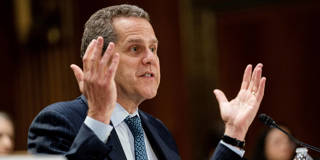Recent developments have served as a reminder that the institutional arrangements governing the setting of capital standards for banks in the United States, the United Kingdom, and the European Union are remarkably different. In its effort to establish a common framework, the Basel Committee faces potentially insuperable odds.
LONDON – What’s in a name? The final proposals for bank-capital rules were dubbed Basel 3.1, as if to suggest a minor tidying-up exercise – just a few grace notes added to a melody composed long ago. But banks, concerned that the implications would be more severe, spoke of Basel 4, implying not grace notes, but a reworking of the entire composition, now in a major key.
That name didn’t stick. Regulators insisted that it was not a new tune, and that anyone who could sing Basel 3 would have no trouble picking up Basel 3.1. But then, some anonymous practitioner in the American political dark arts came up with the term Basel Endgame, which seems to suggest that someone is about to die. On the eastern side of the Atlantic, the term recalls Samuel Beckett’s play, Endgame, about existential angst and the futility and meaninglessness of human life. Non-bankers might find that to be a good description of the debate over the proper size of big banks’ reserves, which has now been ongoing for many years.
Some countries, like Singapore and Australia, have stopped arguing and just gotten on with it. In the European Union and the United Kingdom, the details are almost finalized. But in the United States, the endgame is nowhere near the end – which may even be further away than ever, following US Federal Reserve Chair Jerome Powell’s recent intervention.

LONDON – What’s in a name? The final proposals for bank-capital rules were dubbed Basel 3.1, as if to suggest a minor tidying-up exercise – just a few grace notes added to a melody composed long ago. But banks, concerned that the implications would be more severe, spoke of Basel 4, implying not grace notes, but a reworking of the entire composition, now in a major key.
That name didn’t stick. Regulators insisted that it was not a new tune, and that anyone who could sing Basel 3 would have no trouble picking up Basel 3.1. But then, some anonymous practitioner in the American political dark arts came up with the term Basel Endgame, which seems to suggest that someone is about to die. On the eastern side of the Atlantic, the term recalls Samuel Beckett’s play, Endgame, about existential angst and the futility and meaninglessness of human life. Non-bankers might find that to be a good description of the debate over the proper size of big banks’ reserves, which has now been ongoing for many years.
Some countries, like Singapore and Australia, have stopped arguing and just gotten on with it. In the European Union and the United Kingdom, the details are almost finalized. But in the United States, the endgame is nowhere near the end – which may even be further away than ever, following US Federal Reserve Chair Jerome Powell’s recent intervention.